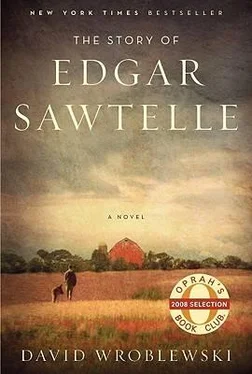It was one thing to live in a world where death stood a distant figure, quite another to hold it in your hands, and Trudy had held it now twice within a month. She thought that night she’d made a pact with death itself: she could stay if she allowed death to stay as well. In choosing life, she embraced contradiction. The night passed. By the time Gar found them the next morning, a great swell of sorrow had risen in her and receded and in its wake the black place had been reduced to a grain.
Afterward she poured her life into the few of them there-into Gar, into Almondine, into the dogs and their training. She locked away that shriveled particle, ignoring and submerging it under feverish work. Years passed. Edgar was born, a never-ending mystery to them all, it seemed, except the dogs. Trudy seldom thought about that night. She came to believe that the black place had left her and to remember with the full force of her imagination would only call it back.
She’d been wrong. After Gar’s funeral, when the pneumonia was at its peak, that tiny seed appeared again in her sleep. Its hull cracked. From the fissure a thread sprouted, delicate as silk. It vanished like a skittish animal the next morning. But her deepest fever dreams were yet to come, and in them she coaxed that tendril out. It circled her hips, her waist, her breasts. It wove itself through her hair and across her face until it bound her up, every inch of it velvety black. A comfort at first. Then she woke one morning to discover the tendrils had become a cage. There was a moment of panic before she remembered how it worked; and then she drew a breath and turned toward it.
She’d made some decisions during the time that followed, bad decisions, possibly. She’d convinced herself that Edgar’s resentment toward Claude would lessen. Now she wondered if that hadn’t played a part in Edgar’s staying away. She could not look directly at this thought, or the thought that Edgar might never return. Such things could be examined only in the periphery of her mind. Such were the contradictions she’d learned to live with. In July, Claude arranged placements for two of Edgar’s litter-Opal and Umbra, the ones Edgar called “the twins”-but when the time came, Trudy balked. Had grown hysterical, in fact, at any diminishment of her son’s presence. The placements were canceled. To placate everyone, she agreed to let two pups go instead. Something they had never done before.
(In the bedroom, Claude had returned. He sat on the edge of the mattress, unbuttoning his shirt. She sighed and turned away.)
For weeks after the pneumonia she forced herself out to the kennel, pretending to be recovering. No, not pretending-she was recovering, in her body. In the mornings, after Edgar boarded the school bus, the silence in the barn was intolerable. Playing music, even worse. Almondine found her and curled up and slept nearby, a comfort, but the bed called to her so strongly, the weight of her encumbrance was so great that by midmorning most days she was in the house exhausted and asleep.
One day, just after noon, Claude’s Impala appeared at the end of the driveway. Trudy watched from the porch as he swung open the barn door and walked inside. She sat in the living room and waited. Finally, she went to the barn. She found him weighing a pup and making notes. He looked at her but said nothing. That entire first week passed almost wordlessly between them except for small questions, immediate problems. Trudy didn’t welcome Claude’s presence, and she couldn’t hide that; she wanted to ask him to leave, but she knew she needed the help. Each day, before Edgar came home, Claude got into his car and drove off, sometimes with no more than a sidelong “G’bye.” Twice, when she looked up, he was simply gone.
That Saturday, when Claude didn’t show up, all she felt was relief. By midafternoon on Sunday she found herself looking out the window. The Impala appeared again late Monday morning. Trudy lay in bed, unable to rouse herself. Then, anger. What was it he wanted? Silent or not, Claude kept coming for a reason. But she needed to be left alone. What little energy she could muster was spent stumbling through the chores and looking after Edgar. She stalked to the barn. Claude was kneeling on the floor of the medicine room. The drawers and cabinets all stood open. Vials of pills and stainless-steel scissors and packages of gauze and bottles of Phisohex and Betadine surrounded him. She intended to ask him to leave but instead blurted out a question.
“Just tell me this. Do you miss him?”
Claude stood and looked at her and licked his lips. He took a breath deep enough to make his shoulders rise.
“No,” he said. And then, after a pause: “I remember him, though. I remember him just like he was.”
She had expected some facile lie. She’d hoped for that; it would make it easier to tell Claude to leave. But he’d spoken the words as if offering a gift of some kind. A reparation. In the silence that followed, she thought he might even apologize for his answer (that would be false, too), but he simply waited. His posture, and the look in his eyes, said he would go if she asked. She still didn’t understand what he was doing, but he wasn’t trying to force his presence on her. He was coming, she thought, for some purpose of his own, to assuage some memory or feeling connected with Gar. Or maybe he was making amends for not grieving his brother’s death.
“If you’re going to keep coming out, you could at least ask me what needs to be done,” she said.
“What, then?”
The first thing that came to mind was that the medicine room was a disaster, that it needed to be thoroughly cleaned, the expired medicines discarded, reorganized. But they were standing in the middle of it, and he was already engaged in exactly that.
“One of Alice’s tires went flat over the winter,” she said.
“All right. What else?”
“Nothing. Everything.”
“Leave the pens in the morning,” he said. “I’ll clean them when I come out.”
WHAT HAPPENED WAS THIS: when Trudy felt most vulnerable, she had seen in Claude a chance to anchor herself, to stop the backward slide that, alone, she could not check. She asked him to recall something of Gar.
“What do you want to know?”
“Anything. Tell me the first thing you remember about him. Your earliest memory.”
His eyes fluttered briefly and he looked away.
“You might not like it,” he said. “I knew a different Gar than you.”
“That’s okay,” she said. “Just tell me.” But inside, she thought: I hope so. If you knew the same Gar, we’re both lost.
“If you really want to know, what I remember is a snowstorm,” he said. “The start of a blizzard-the first one I’d ever seen. I couldn’t have been more than three years old, because seeing that much snow falling was a shock. We were standing in the living room looking out the window, across the backyard and down the field. Everything began to disappear-first the trees at the bottom of the field, then the whole field, and then even the barn. I got the idea that the world had changed forever. It got me so excited I wanted to go outside. I remember wanting to see how many snowflakes I could grab in my hand. Whether I could follow one of them all the way down to the ground and see it land. I wanted to taste one. I didn’t understand that it would be cold and I couldn’t see why Gar stopped me. Except, now that I think about it, he didn’t care about the cold. What he cared was that no one-”
“-put tracks in the snow,” she whispered.
Claude looked surprised and nodded.
“That’s right. He told me how, if we waited until morning, we’d wake up and be amazed. The truck would have disappeared. The barn would be an igloo. But only if we didn’t trample the snow while it was falling. But I’d latched onto the idea that something tremendous was happening-that some force had been let loose, and by morning it would all be back to normal-and I started to run. Next thing I know, he’s standing between me and the kitchen door, pushing me back and yelling.”
Читать дальше
Конец ознакомительного отрывка
Купить книгу












